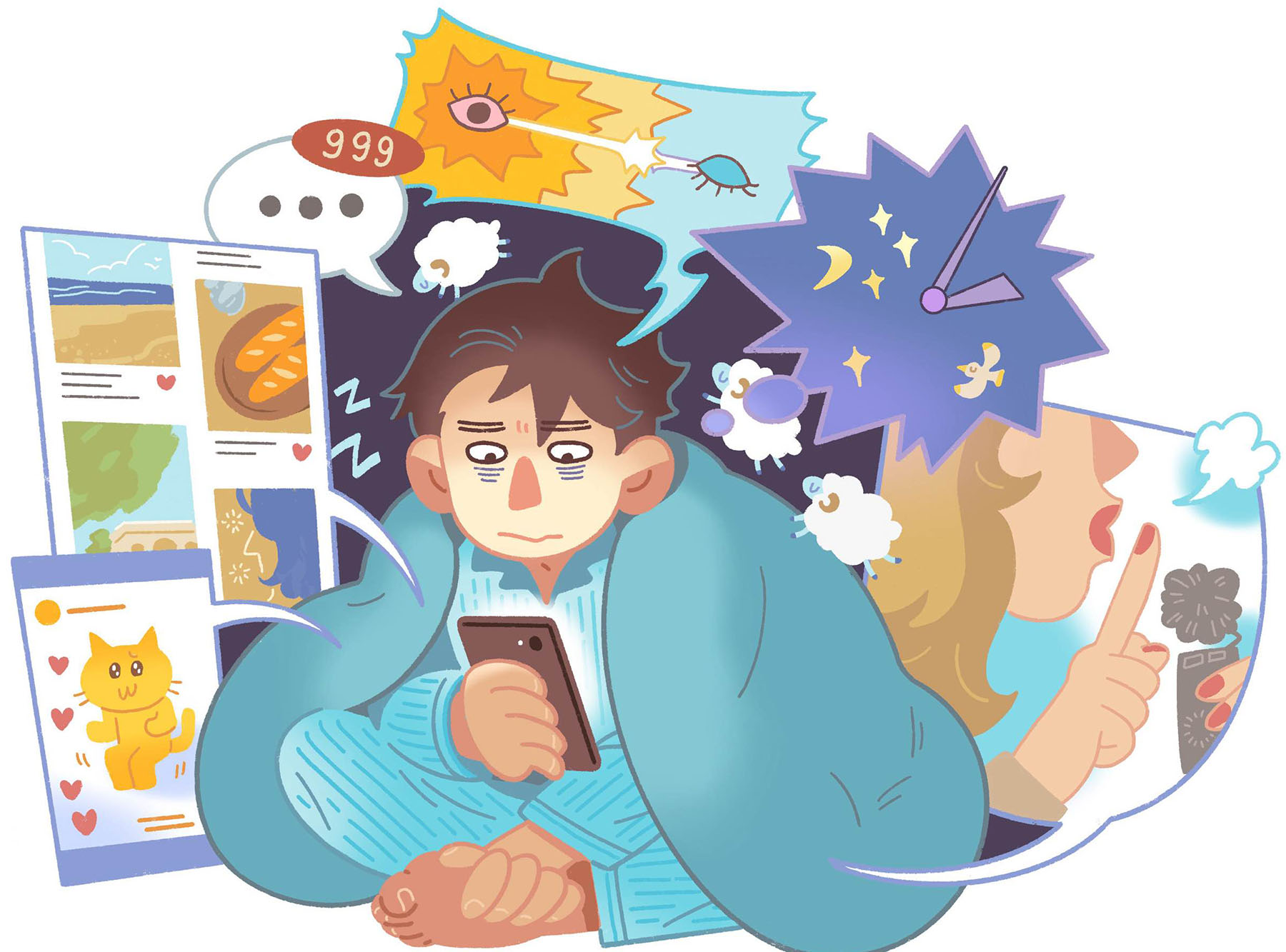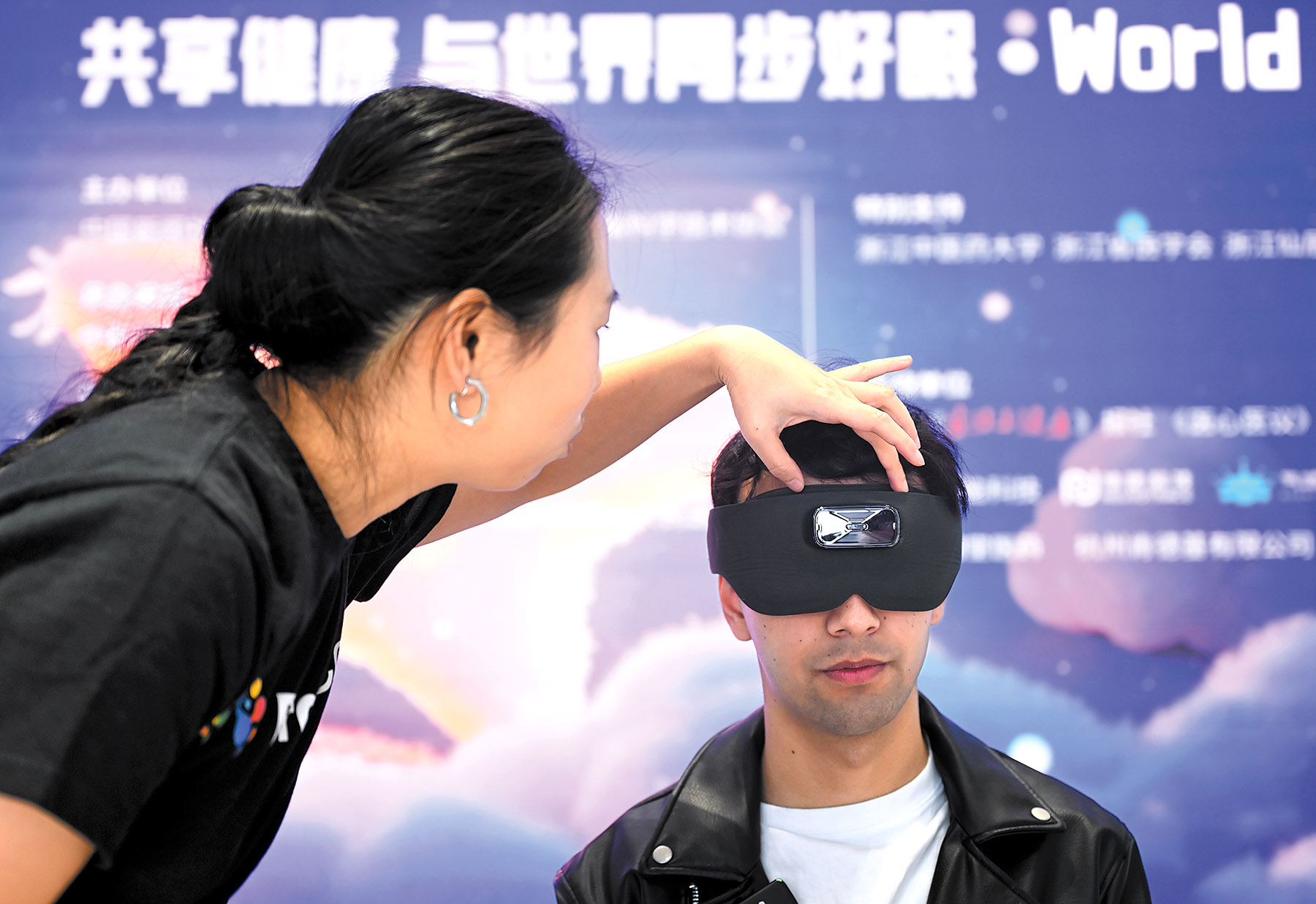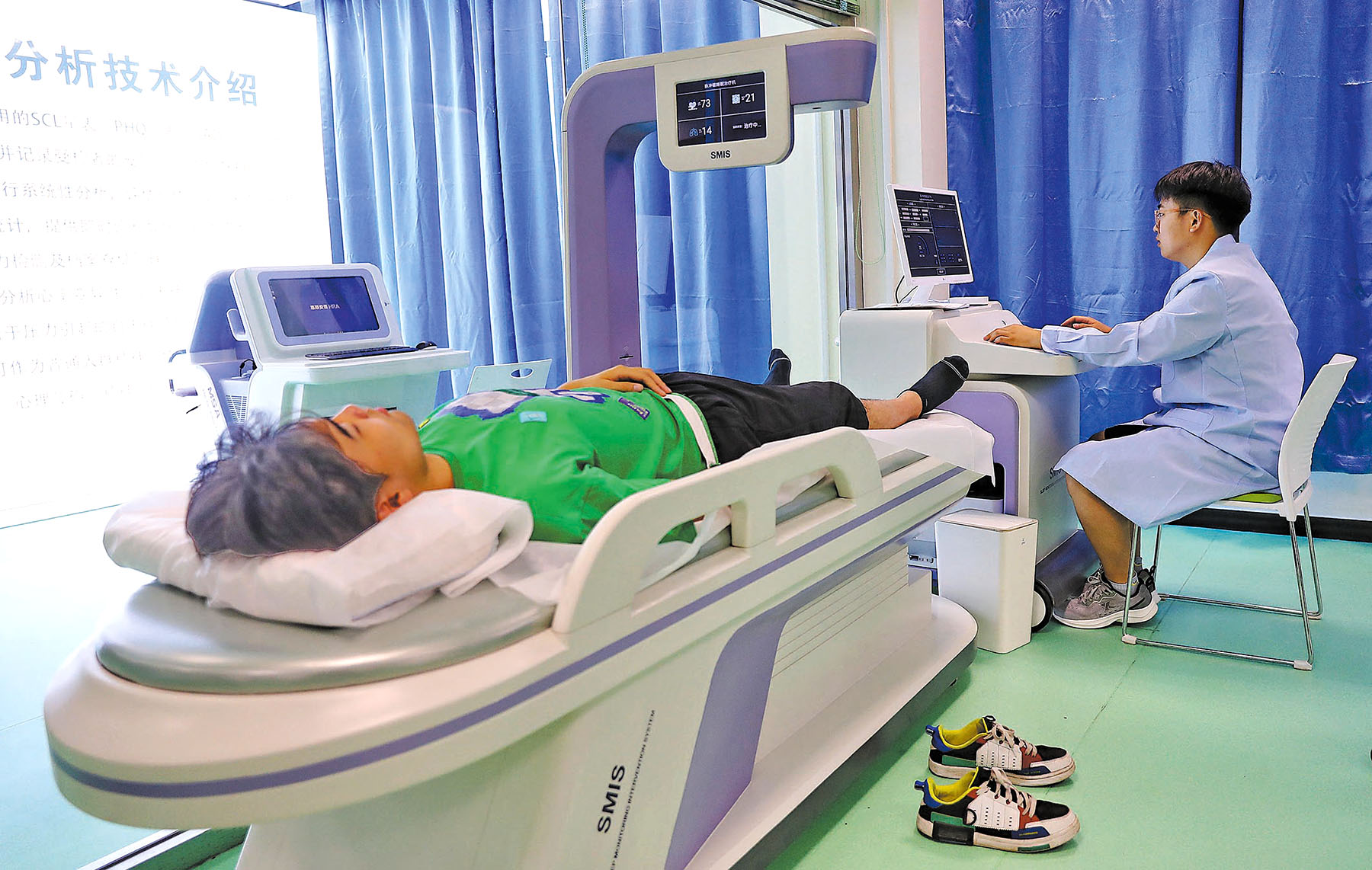Busy lives, screen addiction, contributing to young people getting less shut-eye

An increasing number of young people are turning into night owls, whether that be due to anxiety, phone addiction, having too little "me time" during the day or binge-watching the latest TV show.
According to the 2025 AI Era Healthy Sleep White Paper by iResearch Consulting Group, 82 percent of individuals born after the year 2000 go to bed after 11 pm, while the figure rises to 85 percent for those born in the 1990s.
While there are many reasons that people may stay up late, many do so knowing full well that burning the midnight oil is harmful to their health. A large proportion of those surveyed said they can't stop scrolling through their phones late into the night.
'Revenge' procrastination
Many on social media claim that by sacrificing sleep to make up for the time lost during the day, they are seeking to regain a sense of freedom within themselves.
This "revenge bedtime procrastination" — a phrase that's risen to prominence online — is a form of rebellion for many who spend long hours at work and refuse to go straight to bed once they get home.
However, as their bodies start to show signs of declining function, weakened immunity and reduced memory, they finally realize that they cannot trade off their energy for late-night freedom.
READ MORE: RedNote adds vibrancy to cultural exchanges
"Putting on weight and having 'revenge bedtime procrastination' are two major 'occupational injuries' for contemporary workers," Sun Jia, a white-collar worker in the Xinjiang Uygur autonomous region, wrote jokingly on lifestyle app Xiaohongshu, also known as RedNote.
While food provides the most accessible instant gratification for people under stress, staying up late allows them to regain a sense of control over their own time, the 24-year-old said.
Her reason for staying up late at night is a legitimate one — her work schedule during the day is already packed enough and nighttime is the only time truly reserved for herself, undisturbed.
As such, staying up late used to be her nightly routine. Every workday evening, Sun would lie in bed, mechanically scrolling through short-video apps on her phone, often past midnight.
"I would think to myself, 'Well, I will sleep at 1 am', but I was so addicted that I had lost track of time before I knew it. Then I told myself, 'Definitely sleeping at 1:30 am', however, 1:30 am passed, 2 am passed, and I found myself wide awake and still playing until I was too sleepy to hold the phone," Sun said.
"I thought I was compensating for the time lost during the day by staying up late at night, but the next morning I would wake up feeling utterly terrible," she said.
"My life and my mental state did not improve because of my 'revenge bedtime procrastination', on the contrary, my health bore its consequences."
Putting her foot down, Sun decided she was going to change her behavior, and instead of waking up groggy every day she wanted to wake up spritely and refreshed.
Sun decided to take a gradual approach and make progress bit by bit. "Changing my sleep pattern wasn't easy, but it can be achieved with concrete goals and methods," she said.
"I started by going to sleep 10 minutes earlier each night than the night before. Even if I went to bed at 2 am last night, as long as I go to bed at 1:50 am tonight, it counts as a success. I would also put on an eye mask the moment I set down my phone, to prevent myself from picking it up again."
The strategy turned out to be effective. Sun gradually established a regular and healthy sleep routine. Now, she no longer needs five alarms to wake her up in the morning, nor relies on cups of coffee to survive the day.
"Most importantly, making incremental changes to my sleep pattern has helped me reestablish order in my life, and regaining control over the daily routine gives me a sense of achievement," Sun said.

Nodding-off videos
Sun is among the many young people who've turned to ASMR(autonomous sensory meridian response) recordings to help them fall asleep. These videos, like white noise, trigger a response in the body and help people to relax and fall asleep.
On Xiaohongshu there are more than 40,000 search results for high-quality ASMR videos designed for sleep. Over on Bilibili, a popular video platform, the most-watched ASMR video has garnered over 6 million views and 184,000 favorites.
Users find these videos incredibly helpful for drifting off to sleep.
"It's quite soothing. I don't even realize when I fall asleep. Time just flies by as soon as I close my eyes," commented one Bilibili user from Guangdong province.
Zhou Xiaoxiao, an ASMR blogger with 452,000 followers on social media platforms Douyin and Xiaohongshu, has accumulated 2.52 million likes on her ASMR videos. In her content, Zhou softly whispers, chews food, rubs objects and creates various soothing sounds like brushing, tapping, clicking, crunching and crinkling into a microphone.
"Unlike other bloggers who aim to keep viewers engaged, the feedback I value most is 'Every one of your videos makes me drowsy'," said Zhou. The audience's recognition is what drives her to continue producing ASMR content after nearly five years.
In October 2020, Zhou began creating ASMR videos to help people who struggle to fall asleep. "At that time, freshly graduated from university and dissatisfied with my job, feeling lost about my future, I struggled with insomnia," said the blogger.
After stumbling upon ASMR videos online, she was captivated and started listening to them every night to aid her sleep. When the few bloggers she followed began updating infrequently, Zhou decided to create her own.
What distinguishes Zhou's sleep aid videos is her incorporation of imaginative role play, where she acts out scenarios using sound and visuals to transport the audience into experiences like applying makeup, receiving acupuncture, visiting a hair salon, or even listening to aliens converse.
In one of her most whimsical ASMR videos, Zhou portrays a doctor assisting patients in clearing their tear ducts, producing sounds with various surgical tools to mimic the cleaning process. Audiences described the video as both peculiar and amusing, making them feel as if they were present, shivering with fear.
As a full-time blogger, Zhou livestreams ASMR content from midnight until around 3 am every night, sleeps until past 1 pm the following day, and then begins her day's work. Despite having a slight "jet lag" compared to the typical office worker, Zhou considers her sleep schedule fairly consistent, only experiencing insomnia sporadically due to fluctuating income, unsatisfactory video metrics, or minor life concerns.
When faced with sleep difficulties, she turns to ASMR videos from other creators or reads a book. "The moment I pick up a book, I get sleepy," she said.

Sleeping smart
According to Zhang Bin, a professor and director of the Sleep Medicine Center at Nanfang Hospital of Southern Medical University, good sleep needs a good routine.
"To ensure healthy sleep, it's important to maintain a consistent sleep and wake time, even on weekends," Zhang said. "Even if you must stay up late or prefer to sleep in on weekends, try to limit the variation to within two hours. Avoid using your phone for an hour before bed. Instead, focus on simple tasks that don't require much thought but do expend energy, such as washing up or tidying things, which can help gradually relax your mind."
Zhang warned the perils of short-term "revenge bedtime procrastination" should not be underestimated.
"Youngsters who indulge in late-night TV shows, short videos, or fiction reading on weekends or holidays until the wee hours often struggle to drift off to sleep at their regular weekday bedtime, and subsequently cannot get up early the next day," he said.
This phenomenon, commonly referred to as the "Monday effect", arises from disrupted sleep patterns. "They will find themselves having social jet lag when the body's natural circadian rhythm is thrown off, as a result they feel as if they have traveled several time zones and feel exceptionally fatigued during workdays," said Zhang.
"Sleep allows the body to recover, preventing cardiovascular and metabolic diseases, while at the same time sleep enhances memory and learning, regulates emotions, and reduces the risk of mental illness and dementia."
Nonetheless, Zhang stressed the importance of balancing the natural body clock with modern lifestyles.
"While relishing the pleasures and conveniences afforded by our phones, we should be aware of their effects of delaying the secretion of melatonin due to the light emitted by the screen. Efforts should be made to minimize disruption to the natural circadian rhythms developed through millennia of evolution," he said.
ALSO READ: Growth of 'academic bars' quenches thirst for knowledge
Zhang suggested avoiding phone use for an hour before bed and replacing it with simple, stress-free activities.
He noted that the fear associated with sleep disturbances often eclipses the condition itself.
In fact, altering one's lifestyle, such as retiring to bed earlier and rising later, refraining from daytime exercise, taking supplements, or altering the living environment solely due to sporadic sleep disturbances, may lead to chronic insomnia.
"These changes disrupt your routine and clash with your natural circadian rhythm, potentially perpetuating short-term insomnia," Zhang said.
"Insomnia itself is not terrifying; overly fretting about insomnia is what truly makes you lose sleep," the sleep expert said.
Contact the writer at xunuo@chinadaily.com.cn


